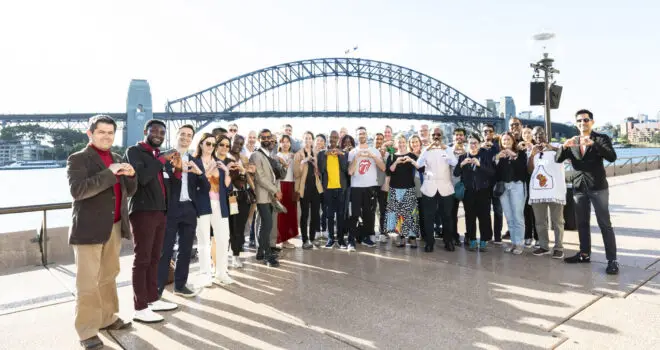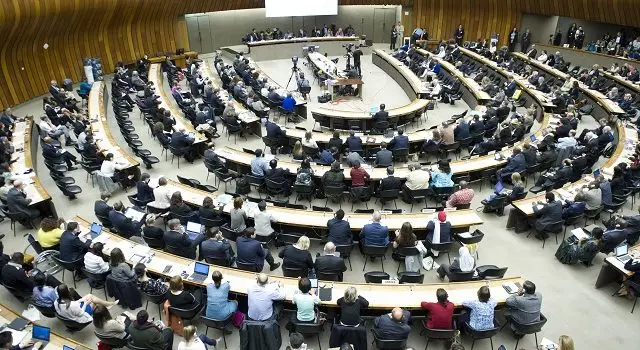Dear Friends,
As 2015 draws to a close we take this opportunity to thank you for your support, celebrate accomplishments, and share highlights to look forward to in 2016.
This year was significant on many fronts, as we launched our new strategies in global advocacy, national plans and CVD roadmaps, capacity building through the Emerging Leaders programme, advocacy and programmes in rheumatic heart disease (RHD) and an enhanced World Heart Day, and as we plan a higher impact World Congress of Cardiology and Cardiovascular Health (WCC). We also initiated changes to membership and governance that will facilitate participation of many more societies and foundations in the workings of the World Heart Federation (WHF).
A watershed moment occurred in September, following extraordinary advocacy efforts across the CVD and NCD communities, when CVD was finally included in the Sustainable Development Goals (SDGs) 2016-2030.
A centrepiece of our 25by25 strategy is the CVD roadmaps, with the first three published in Global Heart and successfully launched in London, Abu Dhabi and Geneva, along with regional events in Brazil, India, Mauritius and Chile. Additional key documents were published on topics ranging from global priorities to nutrition and roadmaps, in the Lancet, Global Heart and JACC, and at the beginning of the year we welcomed our second and highly successful class of Emerging Leaders in Lima, Peru.
Another pillar in our 25by25 strategy is the engagement of members and partners through events, including the CVD Prevention Summit in London and the WHO CVD Consultation in October, where our roadmaps and work in RHD and Fixed Dose Combination Therapy (‘the polypill’) were highlighted. Members have been actively engaged in numerous World Heart Day events across the globe, along the theme of heart health for everyone, everywhere, and at the first-ever Global NCD Alliance Forum 2015, held in Sharjah, United Arab Emirates (UAE). World Heart Day also saw the launch of the RHD Action Alliance at the UN, with senior government officials, patient groups, multilateral organizations and WHF members from across the globe placing RHD firmly on the agenda in endemic countries and through the SDGs.
Other work with partners includes our engagement around workplace heart health with BUPA, with more than 120,000 individuals assessing their ‘heart age’ using our joint tool, and our ongoing projects around children and health with UEFA, including our Eat for Goals app, which now has more than 29,000 downloads, and our Children in the City campaign in Romania, Spain and the UK.
The year also marked the launch of an expanded approach to membership, widening the criteria for joining and welcoming new organizations into our fold as a key part of our transition to the new model of working in partnership to achieve 25by25.
Looking forward to 2016
The coming year promises even greater progress towards reducing CVD mortality by 2025. In June, we expect to welcome over 9,000 members, colleagues and stakeholders to the World Congress of Cardiology and Cardiovascular Health in Mexico, focused on the broadened theme of CV health, knowledge translation and health policy. Pre-Congress events will include the CVD Prevention Summit and Women and CVD Conference, and the Post-Congress event will include one on the polypill.
We will see a substantially expanded and exciting World Heart Day for 2016 with a new member advisory group, coordinated activities all year and a global call on 29 September. We will also be expanding our existing CVD roadmaps for tobacco and hypertension control and for secondary prevention to key regions and to include additional topics including RHD and Atrial Fibrillation, while integrating areas such as cholesterol.
We will be welcoming our third class of Emerging Leaders in Bangalore, India where we will focus on the tobacco roadmap and broader CVD issues. In 2016, we expect to launch the WHF course in CVD prevention (developed in conjunction with the Public Health Foundation of India and the Population Health Research Institute in Canada) for primary care health workers.
Advocacy work will include a focus on identifying core CVD service coverage indicators in Universal Health Coverage and the formation of a new working group to advocate for inclusion of the Fixed Dose Combination Therapy (polypill) on the WHO essential medicines list and at national levels. Fixed Dose Combination Therapy has been proposed for more than a decade as a potential solution to simplify treatment and increase patient adherence, and to overcome barriers at the governance, financing and delivery level. It has great potential to help millions of high risk individuals at low cost and so the World Heart Federation will now develop strategies to scale up the polypill strategy for secondary prevention globally.
Through all of this, we will continue to work with our members and partners to promote CV health and achieve of 25by25. We thank you for your support and look forward to working with you in 2016 and beyond.
With best wishes for a happy and heart healthy 2016.


